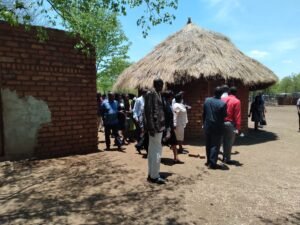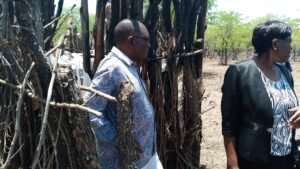…teachers living in grass thatched, run down huts for years
…living and working conditions not for the faint hearted
Brighton Chiseva
MWENEZI – The first question one asks self after arriving at Nyangambe Turf Primary School in ward 15, Mwenezi West Constituency under Chief Chitanga is whether it is commitment or desperation for a qualified teacher to stay for a year or more after being deployed at such a school.
A straight answer is difficult to get even from the teachers stationed at the school but after speaking to them one can simply conclude; it’s both.
The teachers’ living and working conditions point to how the once noble profession has been stripped of its dignity with teachers being reduced to a mere laughing stock.
With only seven years before 2030, it remains to be seen if the authorities preaching of the Vision 2030 of an Upper Middle Class economy would beat the deadline as the clock seems to be ticking at an alarming speed.
It’s hard to believe that a teacher at Pamushana, Ndarama or Gokomere High Schools gets the same salary with a teacher at Turf Primary School where they share blair toilets with pupils. In most cases, unemployed graduates are desperate and they end up taking opportunities that come, with the hope of transferring after being attested in the civil service.
Recently, the Minister of State in the President’s office responsible for monitoring the implementation of government programmes Joram Gumbo came face to face with one of the most unbearable working and living conditions for a teacher during his tour of Masvingo province.
During his visit, Gumbo told the teachers to present all their problems so that he will take them to responsible authorities for them to be addressed.
Amalgamated Rural Teachers Union of Zimbabwe (ARTUZ) Masvingo Provincial Secretary General Andrew Munguri said the teachers are dedicated and patriotic saying government must rather provide an equalization fund to develop rural schools and teachers’ welfare.
“These are dedicated and patriotic teachers of the motherland. It is government’s responsibility to prioritise education. It remains a pipeline dream to have quality education under these dehumanising conditions. There must be an education equalisation fund to improve infrastructure and rural teachers’ welfare. Government is found wanting and sleeping on duty in this regard,” said Munguri.
There are nine unsung heroes at Nyangambe Turf Primary School about 52 kilometres from the Masvingo – Beitbridge road who are enduring some of the harshest conditions but are dedicated to their work.
The living conditions at the school are not for the faint hearted and one will be forgiven if they pack their bags and leave the school less than a week after deployment.
The conditions range from inaccessibility due to poor road network, shortage of standard accommodation, water woes to communication network challenges among others.
The nine teachers, five ladies and four men, are the school head Bernard Chauke who joined the school in 2018, deputy head Tavonga Mafuta who joined in 2019, the longest serving Nesbert Rudishua who joined in 2013, Musame Aleta who came in 2020, Tracy Musekiwa 2021, Itai Chigeza, Isaac Mafira, Rebecca Mavambira and Rhoda Dzingirai who joined the school this year (2022).
The nine teachers share two grass-thatched round huts and three flats a pointer to lack of privacy among the teachers.

The situation also forces the teachers not to stay with their families because the living arrangements not suitable for a family.
The teachers have no stand-alone toilets in the staff quarters and they have to share dilapidated toilets with learners which were built back in 2012—imagine sharing a blair toilet which is already dilapidated with ECD pupils who at times fail to make use of the squat hole and end up messing the whole floor.
They also share a makeshift bathroom which is made of tree poles and branches with a few empty cement sacks inside just to give cover to the essentials leaving legs and shoulders exposed when bathing.

The water point is about 600 metres from the school which is a community borehole and teachers are forced to have a time table to fetch water to avoid congesting with the community who in summer will be drawing water for their livestock.
The area has no shops and teachers have to bring enough food for a month or so since it is difficult to get supplementary grocery items.
“There are no shops here and one has to bring all he or she can carry to avoid inconveniences where they run out of food or other requirements mid-month,” said one teacher.
There is no regular transport to the main road so teachers rely on local farmers’ vehicles or by chance visitors’ vehicles that will be travelling around the area.
The teachers risk spending two or three days holed up at the turnoff from the highway to the school and at the mercy of game rangers who can abuse them especially women.
Sometimes they end up sharing bread and other items they would have brought from town on pay day with game rangers who mane the entrance into a game reserve which they pass through to the school.
“When coming from town or anywhere else, we spend long hours a day or more with the game rangers at the main entrance since it’s risky to travel in the reserve on foot and again it’s a very long distance to the school. So we end up sleeping there and at times we have to share the little we have brought like bread and drinks with the rangers for the time we would have been there,” said another teacher.
During Gumbo’s visit to the school, Chauke emphasized on the need for responsible authorities to avail a ZUPCO bus to the area which he said will serve the whole community.
Masvingo ZUPCO depot manager Isaac Siazuza said he is not allowed to speak to the media.
In terms of accommodation, the teachers use poorly thatched mud bricks round huts with tiny triangle shaped windows which cannot be opened or closed and cannot be curtained where if one wants to close he or she has to use rugs to cover them completely.
The only better house is the head’s quarters, a two roomed flat which he shares with another teacher built of cement bricks but not plastered.
“The houses were constructed by the community but they are poorly thatched. The windows are tiny, the walls are not plastered and they have no cement floors,” said another teacher.
The teachers are most of the times out of touch with the outside world realities since there is network challenge at the school making it difficult to communicate with family and friends.
There is a point with access to connectivity which they use as a staff room though it’s under a tree with suspended poles and some grass thatch on top where open empty cooking oil containers are opened on top and phones are then placed inside while teachers are doing other work and if one rings then the teacher who is close to the place will then have to call the owner of the gadget.
“We are out of touch with the outside world because of network challenges, we have a spot where there is limited network and we hang our cell phones there. It’s difficult to access WhatsApp or any other social media platform,” said another teacher.
One would wonder how during the Covid-19 pandemic peak lessons were conducted as the ministry spoke of e-learning. The situation at Turf is a clear sign of lack of sincerity on part of the policy makers who are always bragging about the country’s literacy level while marginalized communities are left out.
With the implementation of the updated curriculum which would require teachers and learners to always refer to research instruments like the internet, there is no way meaningful learning and teaching would be realized under such a scenario. How would the learners participate in learning of areas like Information and Communication Technology (ICT) when communication network is hard to connect to?
There is no privacy at all at the school since the houses are shared; a married female is forced to share a house with a married male teacher.
The rooms are not properly partitioned and it’s really difficult to talk or do any other activity in the room without the person in the next room over-hearing.
“There is no privacy at all, you cannot bring a friend in the room and talk without the person in the next room hearing unless maybe you talk in whispers. This forces us to bring friends, relatives or spouses at very difficult times,” said another teacher.
